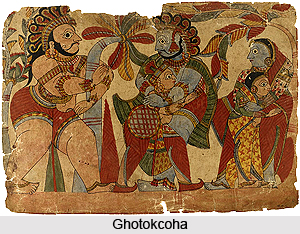 The marriage of Bhima and Hidimbi was not a question of increasing the number of wives but it had a mythical significance. The play says that the Pandavas` escaped from Duryodhana`s firetrap and entered into the forest where Bhima encountered the carnivorous and man-eating Raksasa siblings, Hidimba and Hidimbi. Bhima killed Hidimba and married Hidimbi.
The marriage of Bhima and Hidimbi was not a question of increasing the number of wives but it had a mythical significance. The play says that the Pandavas` escaped from Duryodhana`s firetrap and entered into the forest where Bhima encountered the carnivorous and man-eating Raksasa siblings, Hidimba and Hidimbi. Bhima killed Hidimba and married Hidimbi.
Hidimbi was blessed by Lord Shiva that when she meets a suitable husband all her ugliness will be replaced by beauty and her scent for human flesh will turn to desire. Seeing Bhima all these happened to Hidimbi and she immediately decided to marry each other. Initially Bhima was initially reluctant to marry Hidimbi but finally Bhima agreed to Hidimbi`s proposal. Bhima and Hidimbi had borne a son named Ghatotkacha.
In the Terukkuttu innovation Hidimbi is known as Kamalakkanni. According to historical accounts Kamalakkanni was the goddess who received buffalo sacrifices at the Gingee Fort. The renaming of Hidimbi as Kamalakkanni of Gingee initially motivated by Centiyamman-Kamalakkanni.
Hidimbi is believed to be cannibalistic. But Kamalakkanni of the Gingee Fort has a different figure from that of Hidimbi. Kamalakkanni is a form of the virgin Durga. The Gingee Fort Kamalakkanni is the widow of Acalammacuran, the demon of the Gingee Forest, whose hundred heads Draupadi, severs, leaving the last to be held by Pottu Raja.
This article is a stub. You can enrich by adding more information to it. Send your Write Up to content@indianetzone.com



















